JEA electric bills will stay high in summer heat because of natural gas price spike

JEA customers reaching for the thermostat as summer heats up can expect another season of higher charges on their electric bills because the utility continues to face steep costs for buying natural gas used in power plants.
Beyond the summer, those gas prices will remain high and take a continued toll on JEA customers as the utility passes along the cost on their bills.
The revival of the economy and the war in Ukraine have combined to spike natural gas prices worldwide. JEA forecasts no relief in sight.
For the balance of the fiscal year that will start Oct. 1, a full year of those fuel charges for JEA customers will add up to 17% more in revenue than what the utility expects to spend on fuel in the current fiscal year that goes through the end of September.
"What's happening right now is fuel costs have been going up and down, mainly up, each month," Chief Financial Officer Ted Philips said. "Customers have already been seeing that flow and that will continue to happen."
The fuel charge is a substantial portion of a JEA bill. For a residential customer using 1,000-kilowatt hours a month, the bill before tax and fees in May was $118.08 and the fuel charge accounted for $40.25 of it, according to JEA.
Recently: Moody's upgrades JEA credit rating citing leadership changes, 'sound financial performance'
The JEA fuel charge had been $30.50 the past November and went as high as $49.97 in February. The charge adjusts each month based on the utility's actual cost for purchasing fuel.
The other portion of a JEA bill is the base rate that covers the cost of day-to-day operations, salaries, debt, and the utility's annual contribution to the city. While the fuel charge fluctuates, the base rate has been staying the same for JEA customers on their monthly bills.
For a residential customer using 1,000-kilowatt hours, the base rate has been $77.83 of the total bill. The JEA board approved a 2022-23 budget that anticipates a 1.5% increase in the base rate in April 2023, or right around a $1 increase for a 1,000-kilowatt hour bill.
Plant Vogtle nuclear plant bill coming due
Looking further down the road, JEA is eyeing future base rate increases of 4% in 2024 followed by another 4% bump in 2025 and then a 4.75% rise in the 2026 fiscal year as JEA absorbs the cost of buying electricity from the budget-busting Plant Vogtle Power plant expansion in Georgia.
The latest figure for JEA's multi-year obligation to buy fuel from Plant Vogtle totals about $3.4 billion, compared to $2 billion in 2017 when Westinghouse Electric Co. declared bankruptcy because of Plant Vogtle cost overruns it faced while building the new reactors.
JEA does not own any portion of Plant Vogtle but instead has a contract obligating it to purchase power from the new reactors. The rapid increases in construction costs are forcing similar jumps in what JEA's cost will be to purchase that power from MEAG Power, a part-owner of the reactors.
No "death spiral": JEA scenario used to justify sales attempt in 2019 hasn't happened
Indictments: Federal grand jury indicts former JEA executives on conspiracy, wire fraud
MEAG is exploring an option to put a cap on its portion of the cost for the plant in exchange for being able to sell a smaller amount of power from Vogtle. That could shield JEA from the full brunt of future construction cost increases, but other factors at play include what it would cost to fill that gap in electricity if JEA gets less of its future power from Vogtle.
"It's a tough decision," JEA Vice President of Financial Services Joe Orfano told the board.
This article originally appeared on Florida Times-Union: Natural gas prices will keep JEA electric bills high in summer heat

